Unit 9 Human Biology Lesson 2 课件(共15张,内嵌音频)2024-2025学年高二英语北师版(2019)选择性必修3
文档属性
| 名称 | Unit 9 Human Biology Lesson 2 课件(共15张,内嵌音频)2024-2025学年高二英语北师版(2019)选择性必修3 |

|
|
| 格式 | pptx | ||
| 文件大小 | 4.3MB | ||
| 资源类型 | 教案 | ||
| 版本资源 | 北师大版(2019) | ||
| 科目 | 英语 | ||
| 更新时间 | 2025-05-01 00:00:00 | ||
图片预览

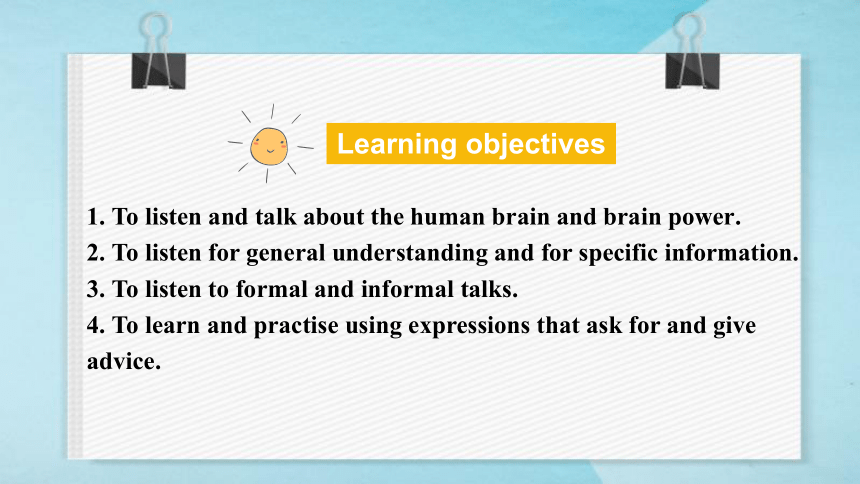
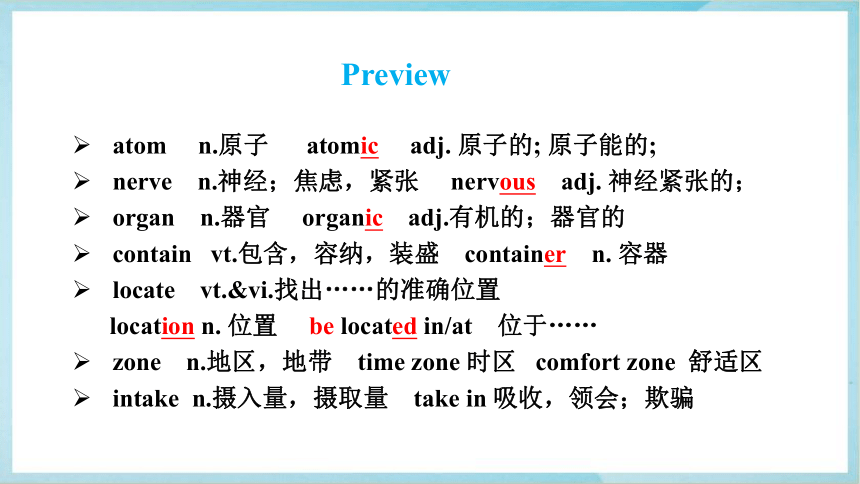
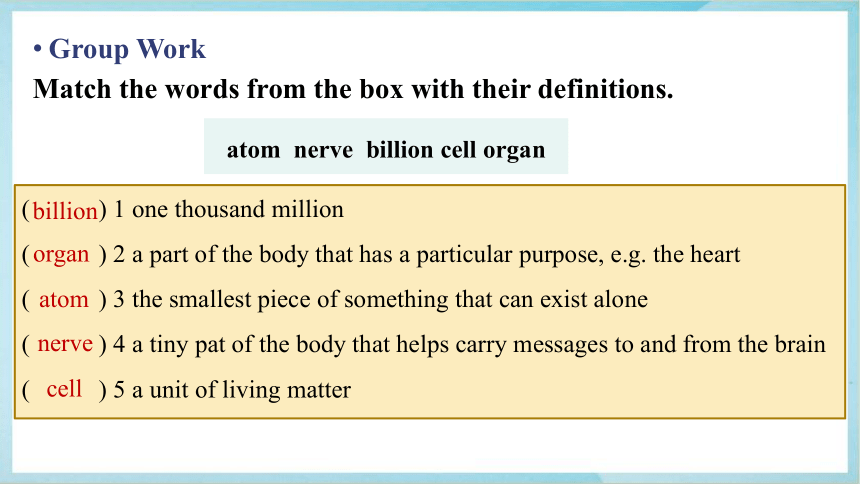
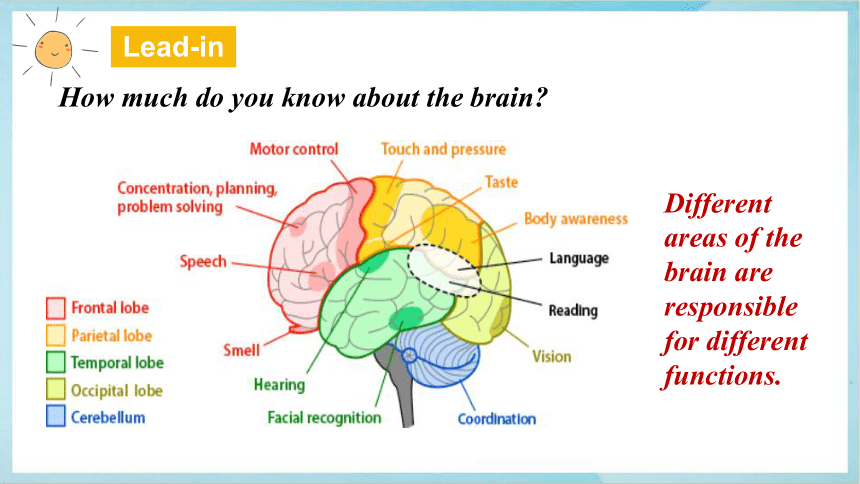
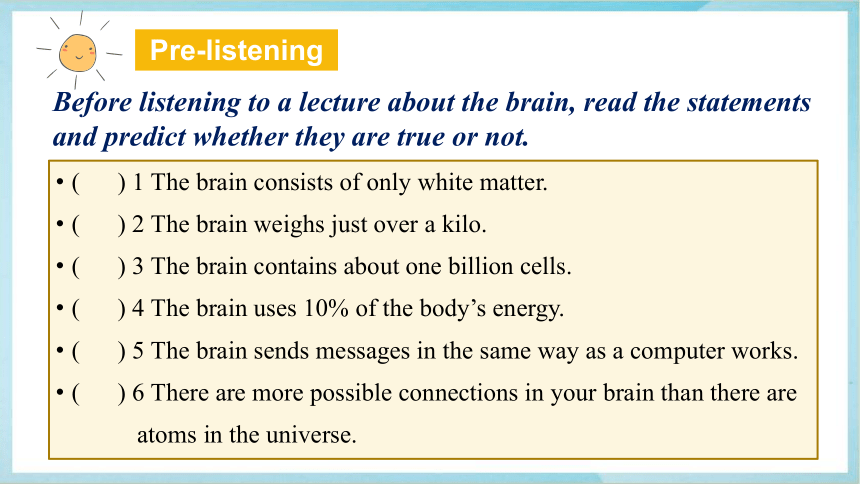
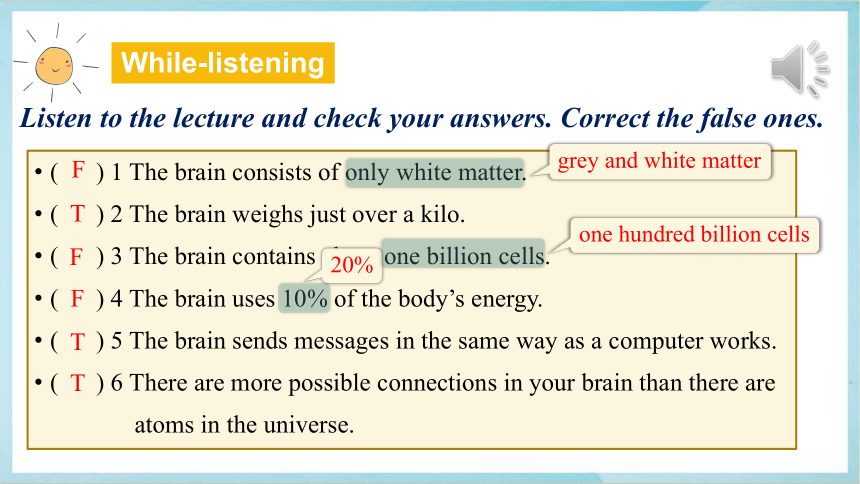
文档简介
(共15张PPT)
UNIT 9 HUMAN BIOLOGY
LESSON 2 BRAIN POWER
Listening
Learning objectives
1. To listen and talk about the human brain and brain power.
2. To listen for general understanding and for specific information.
3. To listen to formal and informal talks.
4. To learn and practise using expressions that ask for and give advice.
Preview
atom n.原子 atomic adj. 原子的; 原子能的;
nerve n.神经;焦虑,紧张 nervous adj. 神经紧张的;
organ n.器官 organic adj.有机的;器官的
contain vt.包含,容纳,装盛 container n. 容器
locate vt.&vi.找出……的准确位置
location n. 位置 be located in/at 位于……
zone n.地区,地带 time zone 时区 comfort zone 舒适区
intake n.摄入量,摄取量 take in 吸收,领会;欺骗
Group Work
Match the words from the box with their definitions.
atom nerve billion cell organ
( ) 1 one thousand million
( ) 2 a part of the body that has a particular purpose, e.g. the heart
( ) 3 the smallest piece of something that can exist alone
( ) 4 a tiny pat of the body that helps carry messages to and from the brain
( ) 5 a unit of living matter
billion
organ
atom
nerve
cell
Lead-in
How much do you know about the brain
Different areas of the brain are responsible for different functions.
Pre-listening
( ) 1 The brain consists of only white matter.
( ) 2 The brain weighs just over a kilo.
( ) 3 The brain contains about one billion cells.
( ) 4 The brain uses 10% of the body’s energy.
( ) 5 The brain sends messages in the same way as a computer works.
( ) 6 There are more possible connections in your brain than there are
atoms in the universe.
Before listening to a lecture about the brain, read the statements and predict whether they are true or not.
While-listening
Listen to the lecture and check your answers. Correct the false ones.
( ) 1 The brain consists of only white matter.
( ) 2 The brain weighs just over a kilo.
( ) 3 The brain contains about one billion cells.
( ) 4 The brain uses 10% of the body’s energy.
( ) 5 The brain sends messages in the same way as a computer works.
( ) 6 There are more possible connections in your brain than there are
atoms in the universe.
grey and white matter
F
T
F
F
T
T
one hundred billion cells
20%
What matter does it consist of
How much does it weigh
How much body’s energy does it use
How many cells does it contain
How are messages sent The brain cells make up __________________, which are connected by ________________. The brain sends messages using ________________.
What have we learnt about the brain in the last ten years There are different areas in the brain, which are __________________________________________. We now know which parts of the brain _____________ different parts of our ___________________from them. The brain also has different areas for different kinds of __________. You have one area for your ________________________ and another area for ______________________________________________.
Listen again. Complete the information you hear about the brain. Then tell your partner what you have learnt about the brain.
Just over a kilo
20%
Over 100 billion cells
nerve cells
electrical impulses
electrical impulses
responsible for different functions
are related to
body and feelings
thinking
first language
a foreign language that you learn when you are older
Grey and white matter
Complete the summary with the words from the lecture.
The brain consists of (1) _______________ matter. It weighs (2) ______________. It uses (3) ______ of the body’s energy. It contains over (4) ______________ which make up nerve cells. These nerve cells are connected by electrical impulses. There are more possible connections in one brain than there are (5) ____________________. Scientists have mapped different areas of the brain that are responsible for (6) ________________. There are also different areas for different types of thinking, such as learning your own language and learning a (7) ____________language.
grey and white
just over a kilo
20%
100 billion cells
atoms in the universe
different functions
foreign
You will listen to a call-in radio programme with five persons. One person is the presenter, and one person is a guest professor. The other three people will ask the professor questions. Listen to the programme and complete the table.
What problem do they have What can they do
Anna:_________________________________________________ ___________________________ ___________________________
________________________________________________________
Memory isn’t as good as it used to be, so do brain exercises really work
challenge their brain with learning new things they are not good at
While-listening
What problem do they have What can they do
John: ______________________ ____________________________ ____________________________ _________ on junk food, ____________________ of Omega- 3fats
Bella: ______________________ ____________________________ ____________________________ ____________________________
____________________________
____________________________
Exams is coming up, so he wonders if there are certain foods that are good for the brain.
Is there any particular kind of exercise that can improve the health of her brain
cut down
increase the intake
do exercise that is good for the heart, such as walking and running
Asking for and Giving Advice
Asking for Advice
____________________ try them
____________________, Professor Kim
So what kinds of activities ___________________
Is there any particular kind of exercise … ________________
Giving Advice
1 _________________________ try learning a new language …
2 _________________________ is to cut down on junk food.
3 _________________________ increase your intake of …
4 _________________________ do exercise that is good for your heart.
Talk Builder
Listen and plete the Talk Builder.
Should I
What’s your advice
do you suggest
What should I do
You could
One thing you can do
It might also be a good idea to
I advise you to
Post-listening
Eat healthy foods. They contain vitamins and minerals that are important for the nervous system.
Get a lot of playtime (exercise).
Wear a helmet when you ride your bike or play other sports that require head protection.
Don't drink alcohol, take drugs, or use tobacco.
Use your brain by doing challenging activities, such as puzzles, reading, playing music, making art, or anything else that gives the brain a workout!
So what can we do for the brain
It uses twenty percent of the body’s energy and it contains over one hundred billion cells. 它消耗身体20%的能量,包含超过1000亿个细胞。
contain vt. 1) to have something inside or include something as a part 包含, 含有, 容纳 e.g. This drink doesn't contain any alcohol.
2) to control or hide a strong emotion, such as excitement or anger 控制, 克制, 抑制(感情) e.g. S he was unable to contain her excitement.
contain oneself 克制自己;自制
container n. 容器
Language point
Homework
Recall what you have learned in the class and write a short paragraph about how to increase brain power.
UNIT 9 HUMAN BIOLOGY
LESSON 2 BRAIN POWER
Listening
Learning objectives
1. To listen and talk about the human brain and brain power.
2. To listen for general understanding and for specific information.
3. To listen to formal and informal talks.
4. To learn and practise using expressions that ask for and give advice.
Preview
atom n.原子 atomic adj. 原子的; 原子能的;
nerve n.神经;焦虑,紧张 nervous adj. 神经紧张的;
organ n.器官 organic adj.有机的;器官的
contain vt.包含,容纳,装盛 container n. 容器
locate vt.&vi.找出……的准确位置
location n. 位置 be located in/at 位于……
zone n.地区,地带 time zone 时区 comfort zone 舒适区
intake n.摄入量,摄取量 take in 吸收,领会;欺骗
Group Work
Match the words from the box with their definitions.
atom nerve billion cell organ
( ) 1 one thousand million
( ) 2 a part of the body that has a particular purpose, e.g. the heart
( ) 3 the smallest piece of something that can exist alone
( ) 4 a tiny pat of the body that helps carry messages to and from the brain
( ) 5 a unit of living matter
billion
organ
atom
nerve
cell
Lead-in
How much do you know about the brain
Different areas of the brain are responsible for different functions.
Pre-listening
( ) 1 The brain consists of only white matter.
( ) 2 The brain weighs just over a kilo.
( ) 3 The brain contains about one billion cells.
( ) 4 The brain uses 10% of the body’s energy.
( ) 5 The brain sends messages in the same way as a computer works.
( ) 6 There are more possible connections in your brain than there are
atoms in the universe.
Before listening to a lecture about the brain, read the statements and predict whether they are true or not.
While-listening
Listen to the lecture and check your answers. Correct the false ones.
( ) 1 The brain consists of only white matter.
( ) 2 The brain weighs just over a kilo.
( ) 3 The brain contains about one billion cells.
( ) 4 The brain uses 10% of the body’s energy.
( ) 5 The brain sends messages in the same way as a computer works.
( ) 6 There are more possible connections in your brain than there are
atoms in the universe.
grey and white matter
F
T
F
F
T
T
one hundred billion cells
20%
What matter does it consist of
How much does it weigh
How much body’s energy does it use
How many cells does it contain
How are messages sent The brain cells make up __________________, which are connected by ________________. The brain sends messages using ________________.
What have we learnt about the brain in the last ten years There are different areas in the brain, which are __________________________________________. We now know which parts of the brain _____________ different parts of our ___________________from them. The brain also has different areas for different kinds of __________. You have one area for your ________________________ and another area for ______________________________________________.
Listen again. Complete the information you hear about the brain. Then tell your partner what you have learnt about the brain.
Just over a kilo
20%
Over 100 billion cells
nerve cells
electrical impulses
electrical impulses
responsible for different functions
are related to
body and feelings
thinking
first language
a foreign language that you learn when you are older
Grey and white matter
Complete the summary with the words from the lecture.
The brain consists of (1) _______________ matter. It weighs (2) ______________. It uses (3) ______ of the body’s energy. It contains over (4) ______________ which make up nerve cells. These nerve cells are connected by electrical impulses. There are more possible connections in one brain than there are (5) ____________________. Scientists have mapped different areas of the brain that are responsible for (6) ________________. There are also different areas for different types of thinking, such as learning your own language and learning a (7) ____________language.
grey and white
just over a kilo
20%
100 billion cells
atoms in the universe
different functions
foreign
You will listen to a call-in radio programme with five persons. One person is the presenter, and one person is a guest professor. The other three people will ask the professor questions. Listen to the programme and complete the table.
What problem do they have What can they do
Anna:_________________________________________________ ___________________________ ___________________________
________________________________________________________
Memory isn’t as good as it used to be, so do brain exercises really work
challenge their brain with learning new things they are not good at
While-listening
What problem do they have What can they do
John: ______________________ ____________________________ ____________________________ _________ on junk food, ____________________ of Omega- 3fats
Bella: ______________________ ____________________________ ____________________________ ____________________________
____________________________
____________________________
Exams is coming up, so he wonders if there are certain foods that are good for the brain.
Is there any particular kind of exercise that can improve the health of her brain
cut down
increase the intake
do exercise that is good for the heart, such as walking and running
Asking for and Giving Advice
Asking for Advice
____________________ try them
____________________, Professor Kim
So what kinds of activities ___________________
Is there any particular kind of exercise … ________________
Giving Advice
1 _________________________ try learning a new language …
2 _________________________ is to cut down on junk food.
3 _________________________ increase your intake of …
4 _________________________ do exercise that is good for your heart.
Talk Builder
Listen and plete the Talk Builder.
Should I
What’s your advice
do you suggest
What should I do
You could
One thing you can do
It might also be a good idea to
I advise you to
Post-listening
Eat healthy foods. They contain vitamins and minerals that are important for the nervous system.
Get a lot of playtime (exercise).
Wear a helmet when you ride your bike or play other sports that require head protection.
Don't drink alcohol, take drugs, or use tobacco.
Use your brain by doing challenging activities, such as puzzles, reading, playing music, making art, or anything else that gives the brain a workout!
So what can we do for the brain
It uses twenty percent of the body’s energy and it contains over one hundred billion cells. 它消耗身体20%的能量,包含超过1000亿个细胞。
contain vt. 1) to have something inside or include something as a part 包含, 含有, 容纳 e.g. This drink doesn't contain any alcohol.
2) to control or hide a strong emotion, such as excitement or anger 控制, 克制, 抑制(感情) e.g. S he was unable to contain her excitement.
contain oneself 克制自己;自制
container n. 容器
Language point
Homework
Recall what you have learned in the class and write a short paragraph about how to increase brain power.
